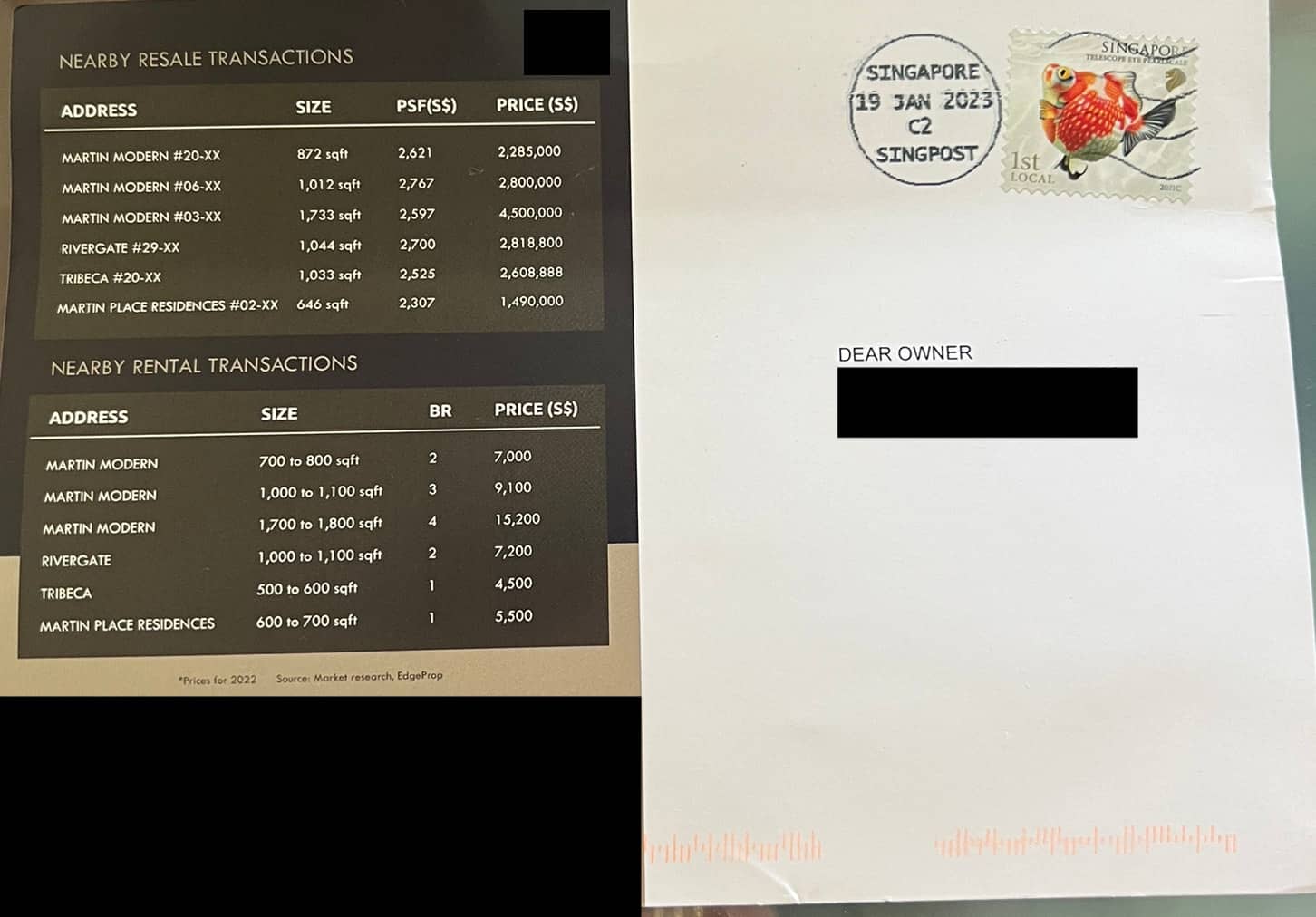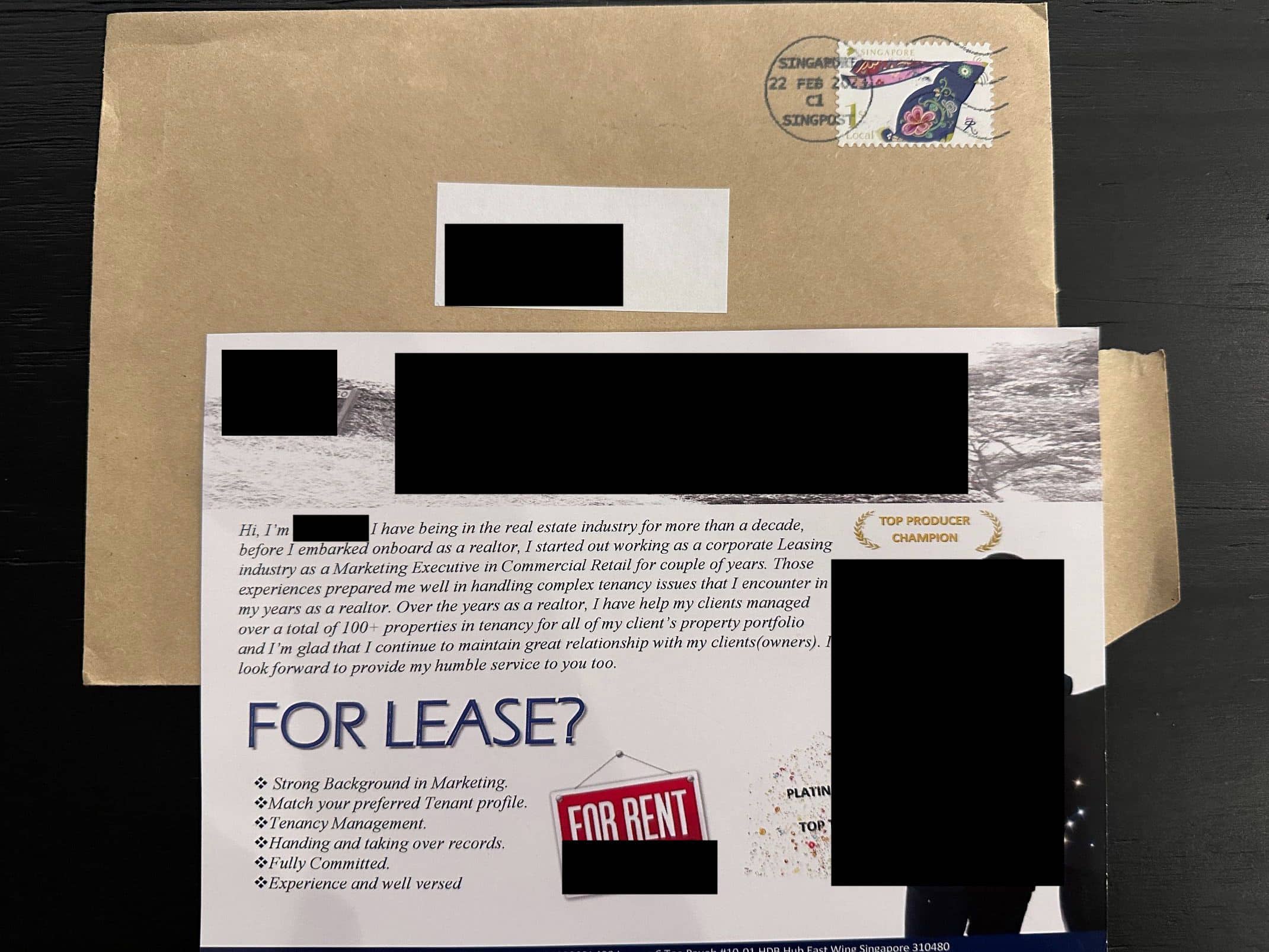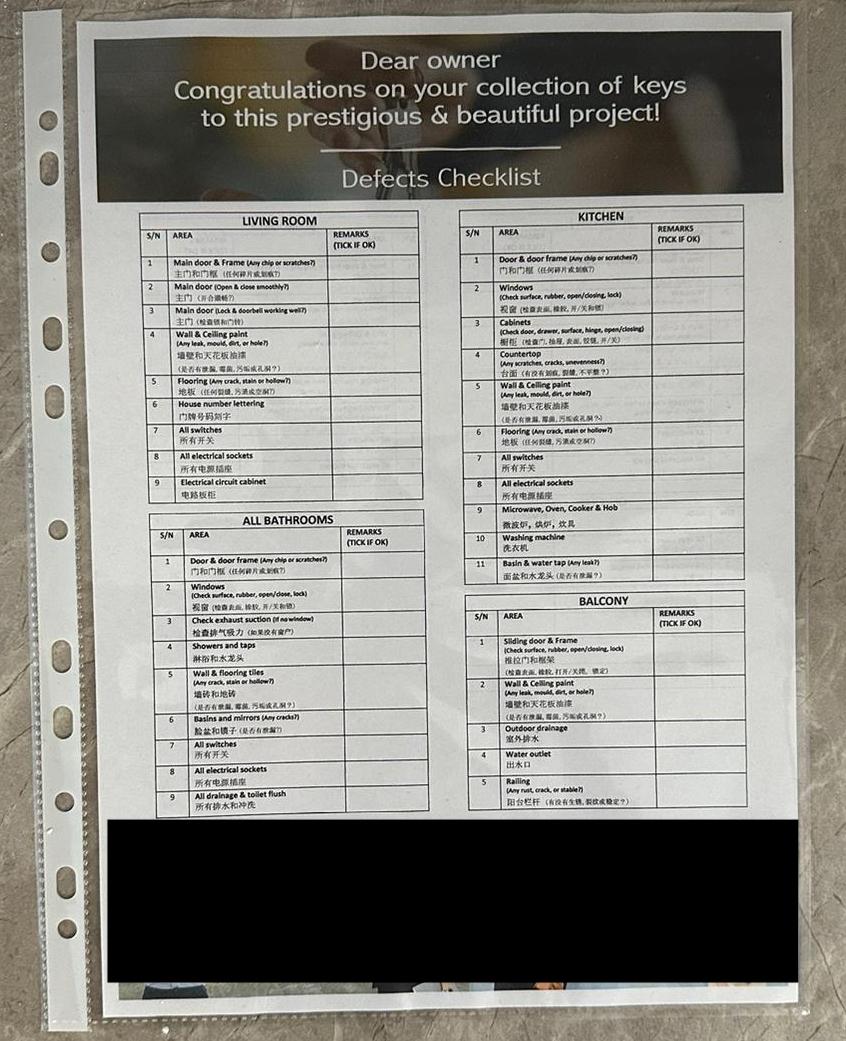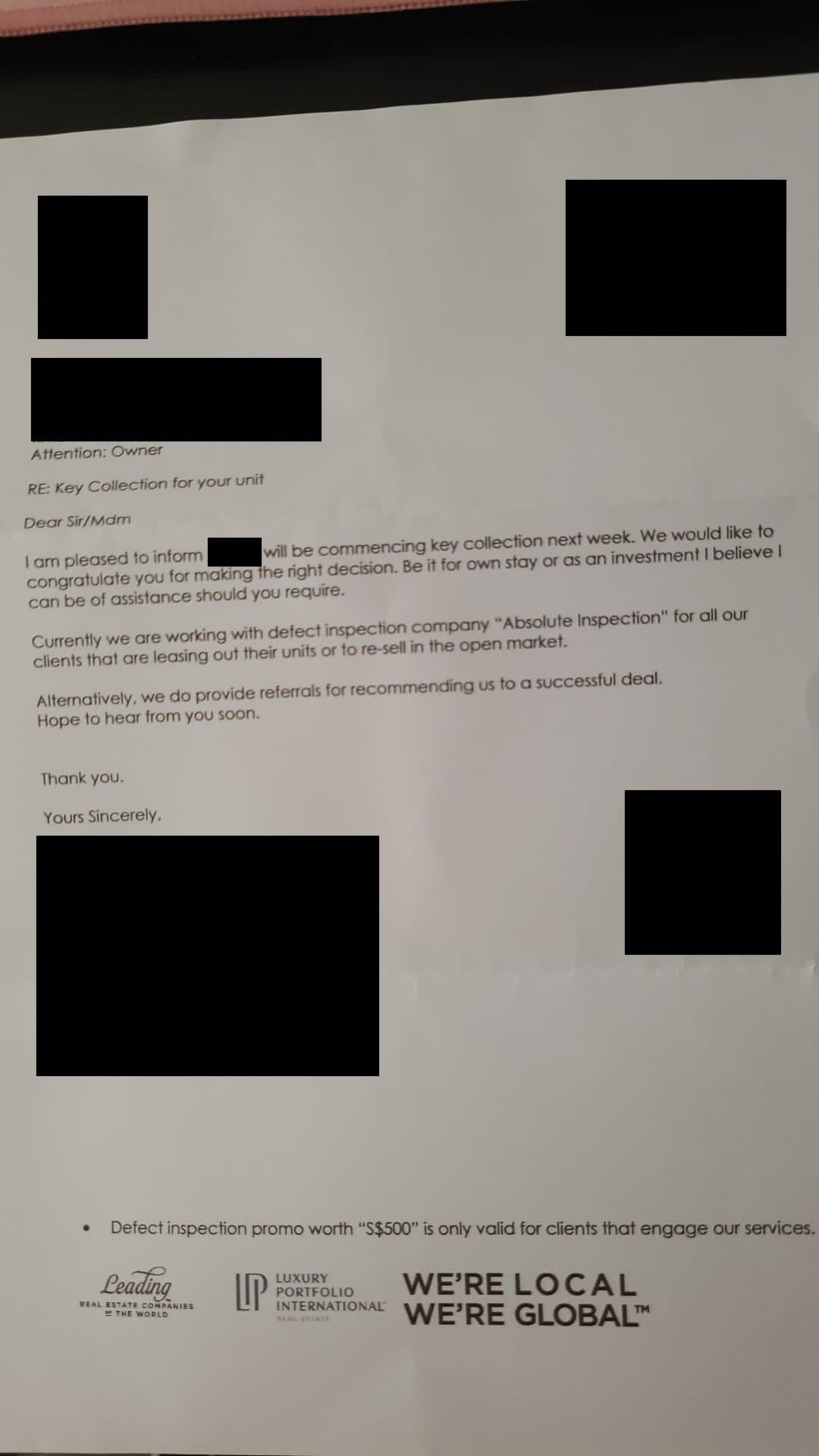“How Do They Know Where I Live!?” New Property Agent Tactics Targeting New Condo Owners
March 2, 2023

Imagine this: You bought a new launch condo a while back, and it’s now getting closer to key collection day.
You open the mailbox in your current home and are faced with the usual deluge of mail. Out goes the generic postcards, envelopes that are just addressed to the “owner”, and random pamphlets.
You know the drill.
You open a couple that is addressed to you with your name printed on the envelope. The first, in particular, catches your attention.
The name of the new launch condo that you bought is emblazoned on the front of the card. Could this be a coincidence?
The rest of the card goes on to boast the agent credentials and forays in the rental market.
It looks like a typical property agent postcard that showcases rental transactions in your surrounding area, except for some reason, this agent managed to get both your name and the property that you bought a year or two ago.
Does that sound like a severe invasion of privacy to you?
We’ve had numerous people write to us about this, as this has been happening to multiple buyers of new launch condos across Singapore (it’s definitely quite startling to some owners). And so this week, we’ll take a closer look at this spate of privacy invasions, and try to find out what’s going on:
So many readers write in because they're unsure what to do next, and don't know who to trust.
If this sounds familiar, we offer structured 1-to-1 consultations where we walk through your finances, goals, and market options objectively.
No obligation. Just clarity.
Learn more here.
Disturbed at home, and at the development
For homebuyer K, who bought her first home at a new launch condo, she was surprised to receive such a targeted mail at her existing home. (The same problem described at the beginning).

But this wasn’t the only issue she faced, as when she visited her new place, she was also disturbed by an agent who was distributing flyers at the development.
“He asked if I was an owner, before handing me a flyer of his services. But even though I told him I already had an agent, he was still insistent that I keep the flyer”.
As she was in a rush, she decided to just keep it and move on. But it was an experience that she really didn’t expect to have to contend with in a private property.
We have seen cases of property agents who would hang around outside the development in hopes of snaring unsuspecting homeowners who may have walked in/out of the development, but approaching owners directly in the compound itself is frowned upon.
To be fair, this practice which was quite prevalent in the earlier years has been less of an issue as of late, as the security would typically prevent agents from accessing the property in the first place. But there’s no stopping property agents who do actually have clients there, from trying to source for other clients in the development.
Flyers or actual agents turning up at the door
Besides flyers sent to your current home, other examples include flyers being slotted under the door of your new house.
(To combat the feeling of receiving spam directly at your door, at least this one has tried to be helpful with a defects checklist.)

With some other developers, buyers found a letter sent to their registered addresses.
The letter congratulated readers on their recent purchase (and by stating that the key collection would be soon), creating the initial impression that the letter was from the developer/sales team. In fact, reading the letter ourselves the first time, we also had to do a double-take to realise it was unrelated to the development team; and it was just agents looking to help buyers rent out their units.

This one is a bit more concerning, as some readers may assume a formal relationship between the developers, and these agents seeking to rent the units.
Meanwhile, some other buyers have received direct phone calls (to their mobile). This may well be a breach of the Personal Data Protection Act (PDPA), as some of the buyers never gave their consent to be contacted over such methods.
But again, it begs the question. How are these agents getting hold of such private information?
Agents approaching new owners aren’t unusual, but the methods used to be less invasive
If an agent wants to offer rental services to new owners, the current usual method is just to hang around inside the new development.
More from Stacked
The Real Reason Homes Keep Getting Snapped Up in Singapore
But that’s exactly the recent issue we’re contending with, now that Singapore has reached a population of 6.11 million; the…
As such, these agents will mull around near the car park, or just a bit further out from the entrance. We’ve even heard of agents who used to print their contact details on a t-shirt and just hang around inside the development (back in the day when it was easier to get into private developments).
Another example would be agents who source for contacts on social media – they might see a buyer post a message about a property transaction, and try to direct message the person.
Some people do forget they disclosed the information themselves on social media, and are shocked when contacted – but that’s somewhat excusable for a hunting agent.
What’s puzzling about the recent spate of events is that it’s impossible with these methods. Agents who camp outside a show flat, or follow you on social media, won’t end up with your address and phone number.
(Even if you were careless on social media and revealed it, most agents wouldn’t have the audacity to turn up at your door, or call you directly).
The biggest mystery is the thought process of these property agents.
See if you can help me figure it out:
- Find someone’s address without their knowledge
- Send unwanted letters to their doorstep like a stalker
- ????
- Get a commission for renting out their new condo
If anyone can figure out how step three works, do enlighten me. Because as far as I know, negotiations that begin with “I know where you live” only work with drug cartels on Netflix.
A concern that goes beyond intrusive marketing tactics
This loss of privacy isn’t just annoying; it’s a potential danger to the buyers. Someone who can find your name, address, and phone number has sufficient data to impersonate you. This could lead to identity theft, or the use of your address for illegal activities.
Back in 2019 for instance, the Ministry of Manpower set up online support for private homeowners to check for misuse of their addresses. At the time, there were cases where foreign workers were illegally registered to the addresses of unknowing homeowners.
Other alarming possibilities include the use of your address for moneylending, or for illegal package grabs (e.g., someone orders something illegal online, but uses your name and address for the pick-up. They will then try to intercept the package as soon as it ends up at your door; but if they fail, you will be the one holding on to the illegal items).
To be clear, we’re not accusing any property agents of doing this; in the above cases, it might just be a bad marketing tactic. But if the agents can get your private details, then more nefarious people might be able to as well; and then the identity theft/misuse of addresses becomes a serious issue.
Until the issue is resolved, stay safe
Be cautious of any forms that you’re asked to fill out, on “official” new launch websites. Some of these promise VVIP previews or other bonuses for registering your name, but you shouldn’t have to disclose your address to get a brochure or invite – at most, an email address for an e-brochure should be enough.
Realtors we spoke to the suspect, but cannot confirm, that this may be the source of some leaks.
But beyond the issue of just who is leaking this data, ultimately it is also what you do with the data that matters. While the competition for clients is always a tough one, and understandably everyone is just trying to make a living, there has to be a firm line drawn when it comes to people’s privacy as well.
Follow us on Stacked as we keep you updated on the situation, and bring you the latest happenings and news in the Singapore property market.
At Stacked, we like to look beyond the headlines and surface-level numbers, and focus on how things play out in the real world.
If you’d like to discuss how this applies to your own circumstances, you can reach out for a one-to-one consultation here.
And if you simply have a question or want to share a thought, feel free to write to us at stories@stackedhomes.com — we read every message.
Frequently asked questions
How are property agents getting my personal information without my consent?
Is it legal for property agents to send me targeted mail or call me without my permission?
What should I do if I receive unwanted marketing materials from property agents?
Can someone use my address for illegal activities if they find out where I live?
Why are property agents approaching new condo owners in invasive ways?
Ryan J. Ong
A seasoned content strategist with over 17 years in the real estate and financial journalism sectors, Ryan has built a reputation for transforming complex industry jargon into accessible knowledge. With a track record of writing and editing for leading financial platforms and publications, Ryan's expertise has been recognised across various media outlets. His role as a former content editor for 99.co and a co-host for CNA 938's Open House programme underscores his commitment to providing valuable insights into the property market.Need help with a property decision?
Speak to our team →Read next from Property Market Commentary

Property Market Commentary How I’d Invest $12 Million On Property If I Won The 2026 Toto Hongbao Draw

Property Market Commentary We Review 7 Of The June 2026 BTO Launch Sites – Which Is The Best Option For You?

Property Market Commentary Why Some Old HDB Flats Hold Value Longer Than Others

Property Market Commentary We Analysed HDB Price Growth — Here’s When Lease Decay Actually Hits (By Estate)
Latest Posts

Singapore Property News I’m Retired And Own A Freehold Condo — Should I Downgrade To An HDB Flat?

New Launch Condo Reviews What $1.8M Buys You In Phuket Today — Inside A New Beachfront Development

Overseas Property Investing This Singaporean Has Been Building Property In Japan Since 2015 — Here’s What He Says Investors Should Know





































0 Comments